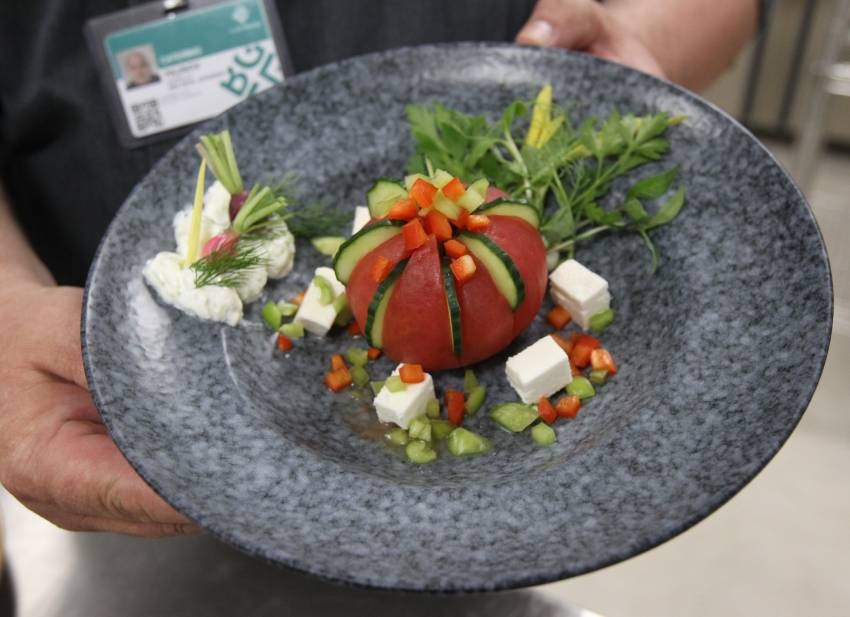Bulgarian banitsa and Shopska salad have more than once occupied the top positions of world gastronomic rankings. But the Bulgarian national cuisine includes much more than these two dishes or the famous meatballs, kebabche, fried potatoes with Bulgarian cheese and tripe soup. It is clear that more and more local dishes and wines are confidently entering the menu of Bulgarian restaurants, but there is still much to be desired in this direction. Professionals often discuss which dishes can be called Bulgarian. The reason is that many of these foods are also typical of other Balkan countries. In addition, in some places there is a trend towards a more modern reading of our national cuisine in response to changes in customer tastes and the spread of the so-called gourmet culture.

However, the traditional Bulgarian products and the recipes of our grandmothers and great-grandmothers are at the basis of everything. How is this enormous wealth preserved and can this country establish itself as a global gastronomic destination?
Bulgaria's potential in this regard is huge and indisputable. The interactive culinary map of the Bulgarian language territory, prepared by a team of the Bulgarian Academy of Sciences, gives a general idea of the diversity of the Bulgarian gastronomic heritage.
Which local dishes, however, could become part of the tourism business card of Bulgaria?

First of all, it is the banitsa, Margarita Koteva, Associate Professor at the Institute for the Bulgarian Language and part of the team that prepared the map, says. "It is available in almost every region with all kinds of fillings. In addition to the cabbage banitsa, which is prepared by the Bulgarian minority in Korçë /Albania/ and is present in the region of Malko Tarnovo and also in Northern Dobrudzha, we find incredible varieties of banitsa," Margarita Koteva says and continues:
"When we speak about dairy products, we can point out our famous yogurt, our homemade butter, our fresh cheese. For example, mozzarella can be replaced with Bulgarian fresh cheese. We can also mention the dishes prepared with bulgur, which is extremely healthy. We have lamb with bulgur, we have plums with bulgur and various sweet dishes. Halva prepared with the so called petmez (pekmez) is a very sweet dessert that also exists. There is an appetizer prepared with dried peppers in the northwestern regions of Bulgaria.The culinary business card can also include the fish soup or the salamurika (type of chilli paste) that is prepared in Tutrakan. Not to mention the different types of fish dishes that are common in the Black Sea region…"

Popular television cooking shows have made some people start looking for new gourmet emotions and the interest in fusion cuisine has also been growing. Many of Bulgaria’s professional chefs have started to modernize traditional Bulgarian recipes according to the new trends in the sector.
"It depends on the chefs themselves, who include these foods in the menus of the hotels and restaurants. The question is that it should be assessed to what extent they should do it, because the Bulgarian cuisine is influenced by the European one. In many ways, we have recipes that have changed over the years and they are no longer so authentic. Some good quality homemade products can be included in a dish and a more modern presentation can be achieved. But people in this country should continue to insist on Bulgarian national cuisine in our restaurants. There should even be a special section in the menus for specific traditional Bulgarian dishes," Margarita Koteva says in conclusion.
Read also:
Publication in English: Al. Markov
Photos: BTA, BGNES
The winter resort of Pamporovo in the Rhodope Mountain is crowded. We are experiencing a strong season and an increase in tourists from Romania, Greece and Serbia. This was told to BTA by Dimitar Gerdzhikov from Pamporovo AD. Gerdzhikov added..
Eight thousand years ago, one of the most mysterious cultures in the Balkans emerged in the area of the present-day village of Dolnoslav. In the area of Asenovgrad , between the plain and the mountains, archaeologists uncover settlement mounds..
St. Valentine's Day is the most long-awaited holiday for lovers and the Bulgarians have a special advantage as we can combine it with Trifon Zarezan- the holiday of wine. And when there is wine, there is love. This wonderful symbiosis..

+359 2 9336 661
